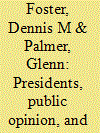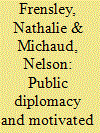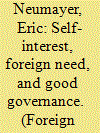|
|
|
Sort Order |
|
|
|
Items / Page
|
|
|
|
|
|
|
| Srl | Item |
| 1 |
ID:
072144


|
|
|
|
|
| Publication |
2006.
|
| Summary/Abstract |
The British choice in Iraq has been characterized as "Tony Blair's War," with many believing that the personality and leadership style of the prime minister played a crucial part in determining British participation. Is this the case? To investigate, I employ at-a-distance measures to recover Blair's personality from his responses to foreign policy questions in the House of Commons. I find that he has a high belief in his ability to control events, a low conceptual complexity, and a high need for power. Using newly available evidence on British decision making, I show how Blair's personality and leadership style did indeed shape both the process and outcome of British foreign policy toward Iraq. The research reemphasizes the importance of individual level factors in theories of foreign policy, as well as offering a comprehensive explanation of a critical episode.
|
|
|
|
|
|
|
|
|
|
|
|
|
|
|
|
| 2 |
ID:
072143


|
|
|
|
|
| Publication |
2006.
|
| Summary/Abstract |
Numerous works have studied the relationship between public approval and the propensity of United States presidents to use force abroad. One of these (Morgan and Bickers 1992 ) relies upon a refined view of internalization-externalization processes to reformulate the diversionary theory of conflict. The authors postulate that, as presidents are concerned with maintaining popularity among individuals upon whose support their continued power rests, they are more inclined to use diversionary force when approval among members of their party declines. Using more extensive and comprehensive measures of militarized actions, we find no support for Morgan and Bickers' original hypothesis, indicating that the results of one of the very few works that finds any evidence of diversion from low public approval may not be valid. In fact, event count analyses reveal that precisely the opposite relationship is operative. Additionally, Morgan and Bickers' formulation fails to account for potential differences in conflict propensity stemming from differences in political parties. We hypothesize that presidents whose partisan supporters are expected to react favorably to "hawkish" actions (Republicans) are more likely to use force abroad when faced with declining partisan support than those leaders whose partisan supporters are generally "dovish" (Democrats). Our results yield little support for this hypothesis. We conclude the article by exploring some possible explanations for our findings.
|
|
|
|
|
|
|
|
|
|
|
|
|
|
|
|
| 3 |
ID:
072140


|
|
|
|
|
| Publication |
2006.
|
| Summary/Abstract |
Successful U.S. public diplomacy requires consonance between the actual message and what the audience comprehends. Contending consonance strategies involve initially formulating foreign policy goals and strategies to resonate with audience values or later changing audience values to support formulated goals. At what foreign-policy-making stage will public diplomacy involvement best facilitate message reception? Recognizing overseas presses as mediators in message reception, we analyze whether foreign affairs reporters are Bayesian or motivated reasoning information processors of U.S. foreign policy statements. Our findings support public diplomacy involvement in the policy formulation stage by showing the most frequently recounted sentences from United States president George W. Bush's post-September 11th speeches invoked frames resonating with Canadian national foreign policy values even when controlling for the effects of journalistic practices.
|
|
|
|
|
|
|
|
|
|
|
|
|
|
|
|
| 4 |
ID:
072141


|
|
|
|
|
| Publication |
2006.
|
| Summary/Abstract |
America's plan to attack Iraq split Europe down the middle. Why did European countries take such different stances toward the Bush administration's policy? This article examines three different approaches, each rooted in one of international relations (IRs) prominent schools of thought, with regard to their explanatory power in this specific puzzle. Firstly, it shows that public opinion (utilitarian-liberal approach) cannot account for whether a state joined the "coalition of the willing" or not. Secondly, it demonstrates that in Eastern Europe systemic forces of power relations (neorealist approach) are suitable for explaining state behavior, but not in Western Europe. Thirdly, it shows that the ideological orientations of governments (liberal-constructivist approach) were the decisive factor in determining whether a state supported the United States in Western Europe, but not in Eastern Europe. These results offer some interesting insights for the theoretical debate in IRs theory and foreign policy analysis, which are discussed in the final section of the article. In regard to foreign policy analysis, for example, the results of this study propose to "bring political parties in."
|
|
|
|
|
|
|
|
|
|
|
|
|
|
|
|
| 5 |
ID:
072142


|
|
|
|
|
| Publication |
2006.
|
| Summary/Abstract |
Bilateral investment treaties (BITs) have become the most important legal mechanism for the encouragement and governance of foreign direct investment (FDI) in developing countries. Yet practically no systematic evidence exists on what motivates capital-exporting developed countries to sign BITs earlier with some developing countries than with others, if at all. The theoretical framework from the aid allocation literature suggests that developed countries pursue a mixture of self-interest, foreign need and, possibly, good governance. We find evidence that both economic interests of developed countries' foreign investors and political interests of developed countries determine their scheduling of BITs. However, foreign need as measured by per capita income is also a factor, whereas good governance by and large does not matter. These results suggest that BIT programs can be explained using the same framework successfully applied to the allocation of aid. At the same time, self-interest seems to be substantively more important than developing country need when it comes to BITs.
|
|
|
|
|
|
|
|
|
|
|
|
|
|
|
|
|
|
|
|
|